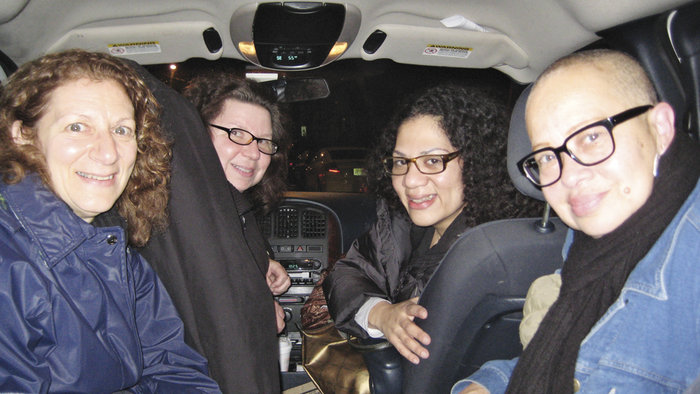Miriam Mendez, a manager at an upscale department store at Short Hills Mall, returned to her home in Jersey City last Wednesday evening exhausted. Still, the married mother of three went out again and spent four hours that night combing the streets looking for people whom many residents would rather ignore.
As one of more than 50 volunteers who helped conduct the annual Point in Time Census of Hudson County’s homeless population, Mendez explained why doing the census held significance for her.
“I have a sales associate who works with me. Young guy, about 19. He’s in college. He and his mom both work, but between the two of them they don’t really make enough to pay rent right now,” Mendez explained. “They had an apartment and the mother had some kind of payment plan. But she fell behind on the payment plan and they got evicted.”
Now her co-worker and his mother spend their nights crashing with different relatives – one place tonight, someplace else tomorrow, another spot the next night.
“That could be any of us.”
This was the first year the Point in Time Census of the Homeless included regular sweeps through the PATH system.
____________
Final figures on the precise number of homeless people who were surveyed on Jan. 31 were not available at press time, since data from Hudson County’s various cities had not yet been compiled. The count that was conducted last year found 1,779 people living without permanent homes in Hudson County. Actual numbers could be much higher, advocates warn, since many people who have lost their homes due to evictions and foreclosures are, like Mendez’s co-worker, among the ranks of the working poor who spend their nights “couch surfing.”
Addressing the chronically homeless
The U.S. Department of Housing and Urban Development requires counties to conduct a census of homeless people every two years, although many counties, including Hudson County, try to do one annually. The information helps determine how federal grant money should be allocated and gives the federal government and communities a sense of which social services are needed.
This year, advocates in Hudson County broadened their outreach efforts to get a better handle on the number of homeless teens on the streets. At the suggestion of young people themselves, three teams of volunteers rode the PATH trains, where many homeless youth supposedly go to blend in with commuters.
This was the first year the Point in Time Census included regular sweeps through the PATH system.
As in other counties throughout New Jersey, the Hudson County census was conducted in two parts.
Early on Wednesday, census counters surveyed people who attended Project Homeless Connect, an event organized by the Hudson County Alliance to End Homelessness held on Bergen Avenue in Jersey City. Through the event, people could get a hot meal, clothing, and access to more than 30 service provider groups who participated.
That night, volunteers fanned out into the streets to count people taking shelter in PATH stations and trains, emergency rooms, fast food restaurants, and on the streets. Dozens of service workers, volunteers, and advocates for the homeless scoped out abandoned buildings, shelters, parks, ERs, transportation hubs, and other spaces.
‘Difficult to capture in a day’
“The homeless population is so big that it’s really difficult to capture in one day,” said Bethe Schwartz, who, like Mendez, is a founding member of the Jersey City Homelessness Advocacy Group (JC-HAG). The women joined with fellow JC-HAGs Renée Tirella Cassidy and Esther Winter to form a team for the Jan. 31 census. “I really think this should be done twice each year,” continued Schwartz. “Once in the fall and again in the spring, because you get different people at different times of the year.”
Although this was the first time Schwartz has participated in the Hudson County homeless census, she has done it several times in New York City, where volunteers often enter abandoned buildings and other dangerous spaces to get the most accurate count possible.
(The advocates who organize these street surveys frown upon such tactics and volunteers are usually warned not to try such tactics.)
Still, Schwartz and Cassidy ventured down a pitch black dead end street and combed a row of scrubs where some homeless men are known to gather.
In all, the JC-HAGs found and surveyed five homeless people during the census and got one – Yvette Wilson, who goes by the nickname “Mom” – into a shelter after discovering that he had been released from the hospital earlier in the day after suffering a seizure.
“There is so much that needs to be done that you can kind of get paralyzed into inaction, because the problem of homelessness is just so big,” said Cassidy. “But we can’t let our own inertia stop us. We have got to move forward on this issue.
E-mail E. Assata Wright at awright@hudsonreporter.com.
